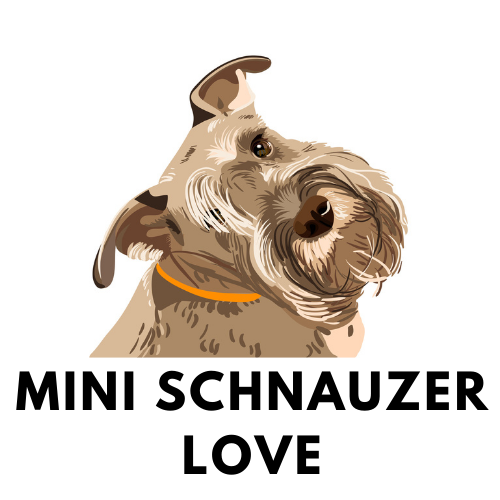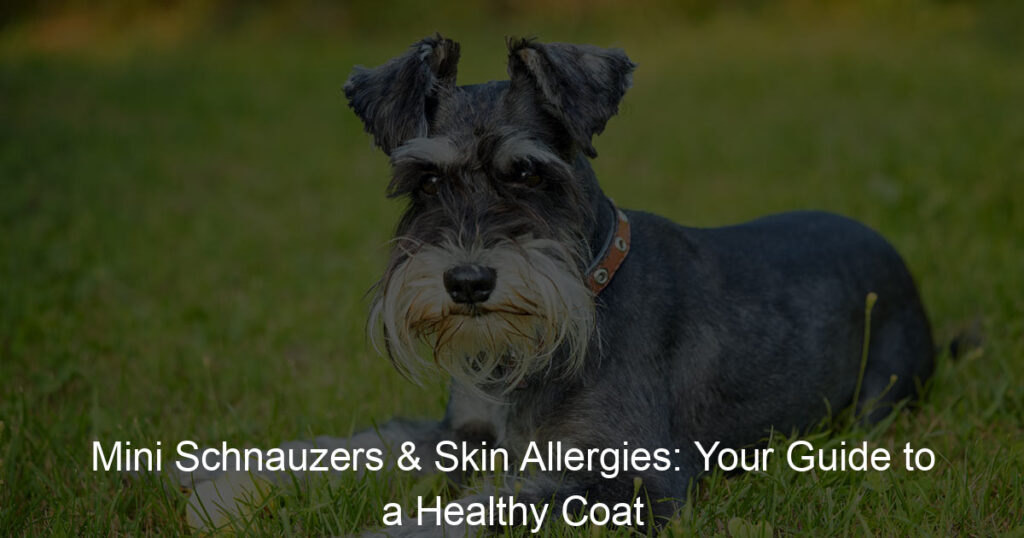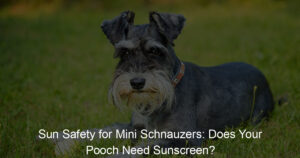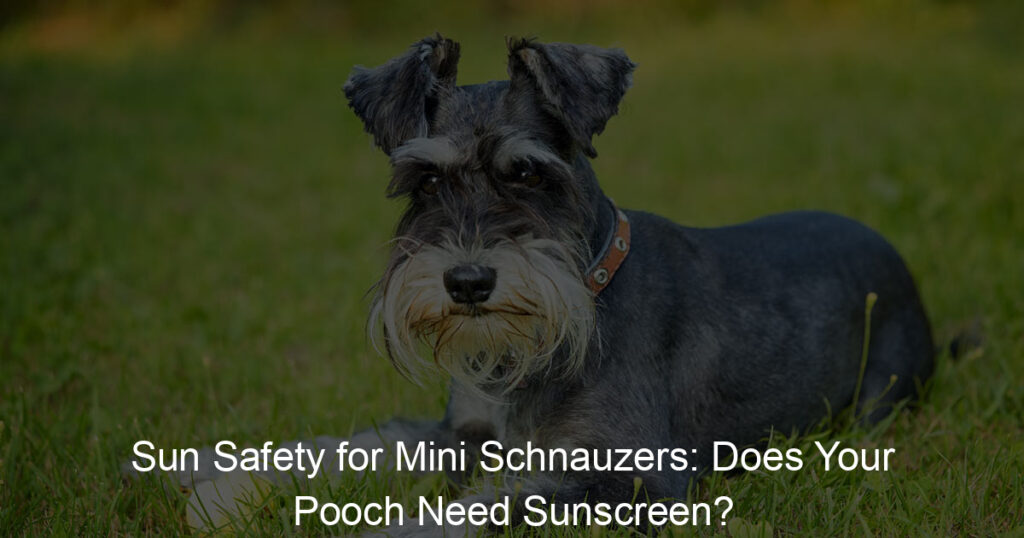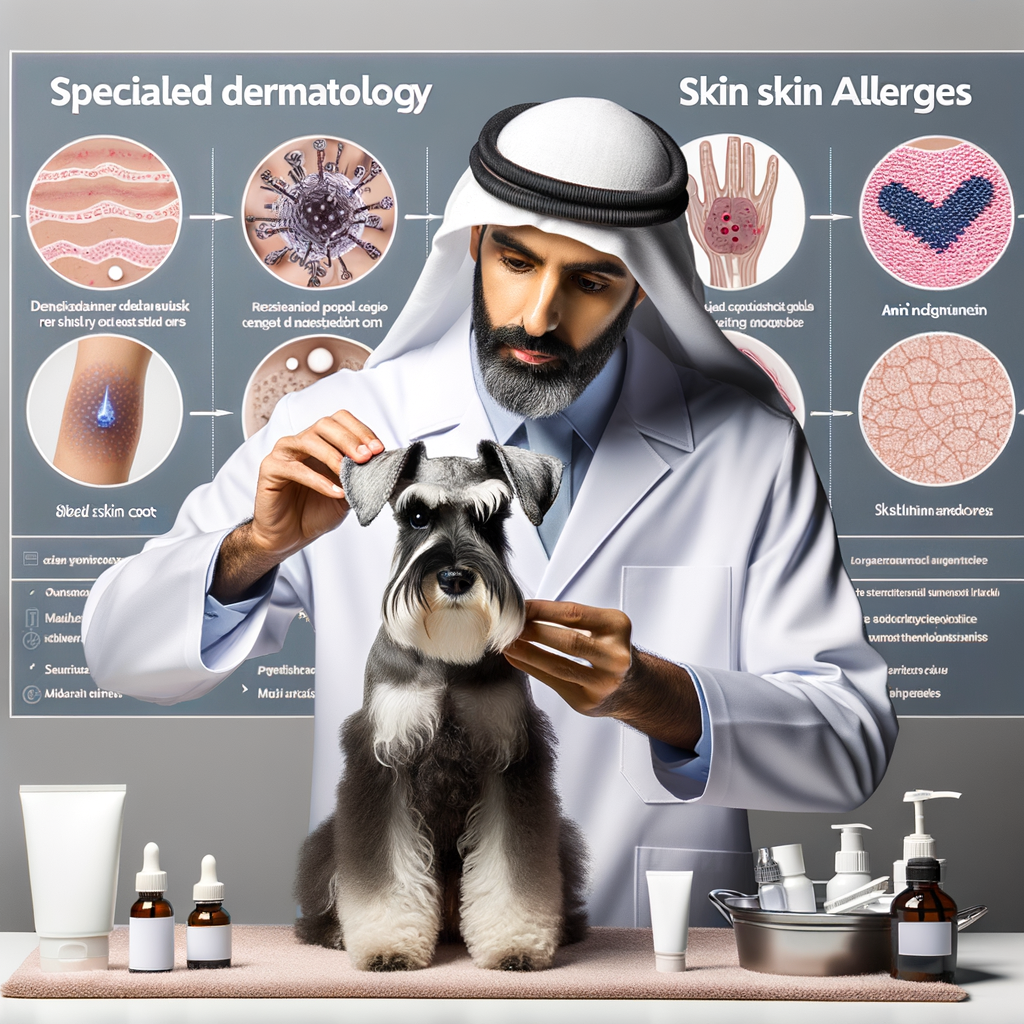
Introduction to Mini Schnauzers Skin Allergies
As a Mini Schnauzer owner, it’s important to understand the unique health challenges your furry friend may face. One of the most common issues is skin allergies. This article will provide an overview of Mini Schnauzers, discuss their common health issues, and focus specifically on skin allergies.
- Overview of Mini Schnauzers
- Common health issues in Mini Schnauzers
- Focus on skin allergies in Mini Schnauzers
Miniature Schnauzers, affectionately known as Mini Schnauzers, are small, energetic dogs known for their distinctive beards and eyebrows. They are part of the terrier group and are popular for their friendly and intelligent nature. Despite their small size, they are robust and active, requiring regular exercise to maintain their health.
Like all breeds, Mini Schnauzers are prone to certain health conditions. Some of the most common include eye problems, heart disease, and skin conditions. According to a survey by the Orthopedic Foundation for Animals, about 15% of Mini Schnauzers are affected by skin conditions, making it one of the most common health issues in this breed.
Skin allergies in Mini Schnauzers can be triggered by a variety of factors, including food, environmental allergens like pollen, or contact with certain materials. Symptoms can include itching, redness, and skin infections. It’s important to identify and manage these allergies to ensure your Mini Schnauzer’s comfort and health.
In the following sections, we will delve deeper into understanding skin allergies in Mini Schnauzers, how to prevent them, and the available treatments. We will also provide some tips on maintaining a healthy coat for your Mini Schnauzer.
Understanding Skin Allergies in Mini Schnauzers
When it comes to Mini Schnauzers, skin allergies are a common health concern. Understanding the causes of these allergies can help pet owners provide the best care for their furry friends. Let’s delve into the main causes of skin allergies in Mini Schnauzers.
Causes of Skin Allergies in Mini Schnauzers
There are three main causes of skin allergies in Mini Schnauzers:
- Environmental factors: Just like humans, Mini Schnauzers can react to certain elements in their environment. This could include pollen, dust mites, mold spores, or even certain fabrics. These allergens can cause an immune response that results in skin irritation and itching.
- Dietary triggers: Some Mini Schnauzers may have food allergies or intolerances. Common dietary triggers include beef, chicken, dairy, wheat, and soy. If a Mini Schnauzer is allergic to a particular food, it can lead to skin problems, among other symptoms.
- Genetic predisposition: Unfortunately, some Mini Schnauzers are genetically predisposed to skin allergies. This means that they are more likely to develop allergies due to their genetic makeup. It’s important to know your pet’s lineage to understand if they might be at risk.
Understanding these causes can help you better manage your Mini Schnauzer’s skin health. In the next section, we will discuss the symptoms of skin allergies in Mini Schnauzers.
Mini Schnauzers Allergy Symptoms
If you’re a proud owner of a Mini Schnauzer, it’s essential to be aware of the symptoms of skin allergies. These symptoms can be quite distressing for your furry friend, but with early detection, you can help manage them effectively. Here are some of the most common symptoms:
- Itchy Skin: One of the first signs of an allergic reaction in Mini Schnauzers is itchy skin. Your dog may scratch, lick, or chew on their skin excessively. This can lead to further complications like skin infections if not addressed promptly.
- Redness and Inflammation: Redness and inflammation are also common symptoms of skin allergies in Mini Schnauzers. You may notice red patches on your dog’s skin, especially in areas where the fur is thin. These areas can become swollen and tender to the touch.
- Changes in Coat Texture: A change in your Mini Schnauzer’s coat texture can be a sign of skin allergies. The fur may become dry, brittle, or thin. In some cases, there may even be hair loss in the affected areas.
Remember, these symptoms can vary from dog to dog. Some Mini Schnauzers may exhibit all these symptoms, while others may only show one or two. If you notice any of these symptoms in your Mini Schnauzer, it’s important to consult with a vet immediately.
Mini Schnauzers Health Tips: Preventing Skin Allergies
One of the most effective ways to prevent skin allergies in Mini Schnauzers is by ensuring they have a healthy coat. This can be achieved through proper nutrition, regular grooming, and appropriate skin care. In this section, we will focus on the importance of proper nutrition for maintaining a healthy coat.
Proper Nutrition for a Healthy Coat
Proper nutrition plays a crucial role in maintaining your Mini Schnauzer’s healthy coat and preventing skin allergies. Let’s delve into the importance of a balanced diet, recommended food, and supplements for skin health.
- Importance of a Balanced Diet
- Recommended Food for Mini Schnauzers
- Supplements for Skin Health
A balanced diet is essential for your Mini Schnauzer’s overall health and particularly for maintaining a healthy coat. It provides all the necessary nutrients that your pet needs to keep its skin healthy and allergy-free. A diet rich in proteins, vitamins, and minerals can help strengthen your pet’s skin barrier, reducing the risk of skin allergies.
Feeding your Mini Schnauzer with high-quality dog food is recommended. Foods that are rich in Omega-3 fatty acids, such as fish and flaxseed, can help maintain a shiny and healthy coat. Additionally, foods like sweet potatoes, carrots, and blueberries are rich in antioxidants that can help protect your pet’s skin from damage.
Supplements can also be beneficial for your Mini Schnauzer’s skin health. Omega-3 fatty acid supplements can help improve skin health and reduce inflammation. Vitamin E is another beneficial supplement as it helps maintain skin health and has antioxidant properties. However, always consult your vet before starting any supplement regimen for your pet.
In conclusion, a balanced diet, high-quality food, and appropriate supplements can significantly contribute to your Mini Schnauzer’s skin health and help prevent skin allergies. Remember, a healthy coat is the first line of defense against skin allergies.
Regular Grooming and Coat Care
Proper grooming is essential in maintaining the health and happiness of your Mini Schnauzer. It not only keeps their coat looking great, but it also helps prevent skin allergies. Let’s delve into the details.
- How often to groom your Mini Schnauzer
- Best grooming tools for Mini Schnauzers
- Benefits of regular grooming
How often you groom your Mini Schnauzer depends on their individual needs and the length of their coat. Generally, a thorough grooming session every 4 to 6 weeks is recommended. However, regular brushing at home should be done at least twice a week to keep their coat free from mats and tangles, and to remove any allergens that may have clung to their fur.
Choosing the right grooming tools can make a significant difference in the health of your Mini Schnauzer’s coat. A slicker brush is excellent for removing loose hair and preventing mats. A comb with both wide and narrow teeth can be used for different parts of their coat. For trimming, a pair of good quality grooming scissors and a clipper set designed for dogs are essential. Remember, always choose tools that are comfortable for both you and your pet to ensure a positive grooming experience.
Regular grooming is beneficial in many ways. It helps keep your Mini Schnauzer’s coat in top condition, reduces the chance of skin infections, and allows you to check for any signs of skin allergies or other health issues. Plus, grooming sessions can be a great bonding time for you and your pet. It’s a win-win situation!
In conclusion, regular grooming and coat care are crucial in preventing skin allergies in Mini Schnauzers. By grooming your pet regularly and using the right tools, you can keep their coat healthy and shiny, and reduce the risk of skin issues. Remember, a well-groomed Mini Schnauzer is a happy Mini Schnauzer!
Mini Schnauzers Allergy Treatment
When it comes to treating allergies in Mini Schnauzers, it’s important to know when to seek professional help and what to expect during the vet visit. Here, we will discuss these aspects in detail.
When to See a Vet
It’s crucial to recognize the signs that your Mini Schnauzer may need medical attention. Not all symptoms are obvious, and some may be subtle. However, early detection can make a significant difference in your pet’s health and comfort.
- Signs your Mini Schnauzer needs medical attention: If your Mini Schnauzer is excessively scratching, biting, or licking its skin, it could be a sign of an allergic reaction. Other symptoms may include redness, inflammation, and hair loss. If these symptoms persist or worsen, it’s time to see a vet.
- What to expect at the vet: During the visit, the vet will likely perform a physical examination and may conduct allergy tests to determine the cause of the symptoms. They may also ask about your pet’s diet, environment, and lifestyle to help identify potential allergens. Based on the findings, the vet will recommend a treatment plan tailored to your Mini Schnauzer’s needs.
Remember, early detection and treatment can help manage your Mini Schnauzer’s allergies effectively. So, don’t hesitate to seek veterinary help if you notice any unusual behavior or symptoms in your pet.
Treatment Options for Skin Allergies
If your Mini Schnauzer is suffering from skin allergies, it’s crucial to know that there are several effective treatment options available. These treatments can help alleviate discomfort and promote healthier skin. Let’s explore these options:
- Topical Treatments
- Oral Medications
- Allergy Shots
Topical treatments are applied directly to the skin. They can be in the form of creams, ointments, or sprays. These treatments can provide immediate relief to itchy or inflamed skin. They often contain ingredients like hydrocortisone, which reduces inflammation and itching. Remember, it’s essential to follow the vet’s instructions when applying these treatments to prevent any adverse effects.
Oral medications are another effective treatment option for skin allergies. These are usually prescribed by a vet and can include antihistamines, corticosteroids, or antibiotics. Antihistamines can help reduce itching and inflammation, while corticosteroids can help control severe allergy symptoms. Antibiotics may be prescribed if there’s a secondary bacterial infection due to constant scratching.
Allergy shots, also known as immunotherapy, can be a long-term solution for skin allergies. These shots work by gradually exposing your Mini Schnauzer to small amounts of the allergen, helping their immune system become less sensitive over time. This treatment option is usually considered when other treatments haven’t been effective. It’s important to note that allergy shots require a commitment as they are typically administered over a period of months or even years.
Remember, each Mini Schnauzer is unique, and what works for one may not work for another. It’s essential to work closely with your vet to find the most effective treatment plan for your furry friend.
Mini Schnauzers Skin Care: Maintaining a Healthy Coat
Keeping your Mini Schnauzer’s skin and coat healthy is essential for their overall well-being. This includes managing any skin allergies they might have. Here are some tips to help you in this endeavor.
Tips for Mini Schnauzers Skin Allergies
Dealing with skin allergies in Mini Schnauzers can be a challenging task. However, with the right approach, you can help your furry friend lead a comfortable and itch-free life. Here are some tips:
- Home remedies for skin allergies: Some home remedies can help soothe your Mini Schnauzer’s skin. For instance, oatmeal baths can provide relief from itching. To prepare an oatmeal bath, grind plain oatmeal into a fine powder and mix it with warm water. Let your dog soak in this mixture for about 10-15 minutes. Remember, these remedies should not replace a visit to the vet but can provide temporary relief.
- Preventing flare-ups: Prevention is always better than cure. To prevent skin allergy flare-ups, keep your Mini Schnauzer’s environment clean. Regularly wash their bedding and toys, and keep them away from known allergens. Also, a balanced diet rich in omega-3 fatty acids can help strengthen their skin’s natural defenses.
Remember, every dog is unique, and what works for one might not work for another. Always consult with your vet before trying any new remedy or preventive measure. With patience and care, you can help your Mini Schnauzer maintain a healthy and shiny coat despite their skin allergies.
Long-Term Coat Care for Mini Schnauzers
Keeping your Mini Schnauzer’s coat healthy is a long-term commitment. It involves a regular grooming routine, a balanced diet, and regular vet check-ups. Let’s delve into these aspects in detail:
- Regular Grooming Routine
Regular grooming is essential for maintaining your Mini Schnauzer’s coat. It helps to keep the coat clean, shiny, and free from mats. Brush your Mini Schnauzer’s coat at least once a week using a slicker brush to remove loose hair and prevent tangles. It’s also important to trim their coat every 5-8 weeks to keep it neat and manageable.
- Diet for a Healthy Coat
What your Mini Schnauzer eats can significantly affect the health of their coat. A balanced diet rich in omega-3 and omega-6 fatty acids can help to keep their coat shiny and healthy. Foods like fish, flaxseeds, and walnuts are excellent sources of these nutrients. Remember, a healthy coat is a sign of a healthy dog, so make sure your pet is getting the right nutrition.
- Importance of Regular Vet Check-Ups
Regular vet check-ups are crucial for maintaining your Mini Schnauzer’s coat health. Vets can detect early signs of skin allergies, parasites, or other health issues that can affect the coat’s condition. They can also provide advice on the best grooming techniques and diet for your Mini Schnauzer. Make sure to schedule a vet visit at least once a year, or more frequently if your pet has a history of skin issues.
In conclusion, long-term coat care for Mini Schnauzers involves a combination of regular grooming, a balanced diet, and regular vet check-ups. By following these steps, you can ensure that your Mini Schnauzer’s coat remains healthy and beautiful for years to come.
